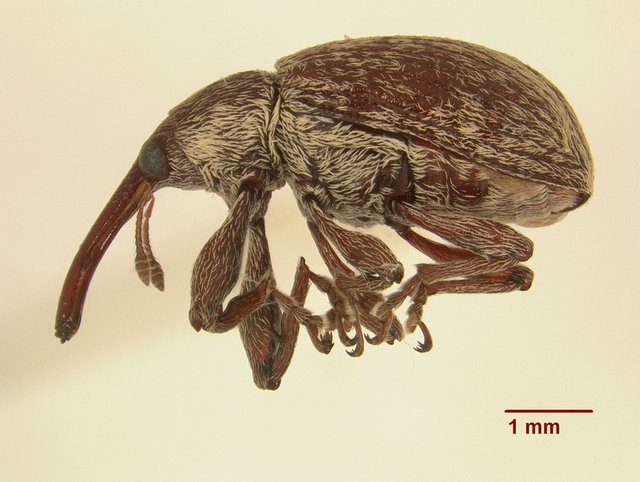#The cotton Weevil#
Hello community
Starting the week of publications proposed by Brother @abiye about pests in crops, I wish you much success in your publications and that the information presented is useful for all and in space for small farmers and communities that do field work his means of sustenance. Weevils are herbivorous insects and although there are more than sixty thousand species grouped in different families. Some can be very harmful and kill crops, others are appropriate for pest control.
Physical characteristics:
- It is reddish brown although it changes to a brown color when it is more adult.
- It has 2 pairs of wings, the first ones are hard and they fold back covering the abdomen and the second ones are gray and they are plagued to the previous ones.
- Its thin and curved peak measures between 3 and 9 millimeters.
- It has teeth or spurs on the legs, distinguishing the 2 teeth that meet the femur of the anterior legs.
Habitad and behavior:
- The commercialization and cultivation of cotton throughout the American continent has caused this plague to spread easily through plantations.
- The wild plants of cotton have served for the development of this plague.
- It is an insect that is capable of wintering in the remains of harvest as well as around the protected areas and reappear in the spring.
- Adult females and males feed on buds, flowers and acorns.
Reproduction:
- It is known that when the female is sexually mature the male releases a combination of 10 pheromones. The female deposits between 100 and 300 eggs by piercing the buds of the cotton flower by placing 1 to 2 eggs per flower, then covering her misdeed with a whitish serous substance secreted by her accessory glands.
- The eggs deposited become larvae in 3 to 4 days and their cycle is completed as a larva in 8 days, completing their development as a pupa in 7 or 8 days. The adult lives around 30 days.
Control and fumigation:
The cotton boll weevil does not have natural enemies that have been so difficult to eradicate the plantations becoming a nightmare for producers. It is for this reason that prevention is the main defense against this plague by placing pheromone traps 2 months before sowing and changing them every 2 weeks since the insecticides and pesticides are not 100% effective.
If an outbreak appears, it should be sprayed immediately and insecticides replaced by defoliants in the next round of fumigation.
It is the responsibility of the producer and workers to clean stubble, bushes and weeds, since it is vital to eliminate large populations of this type of insects in such a way as to avoid suffering the consequences of this pest.
Congratulations @dyanna! You have completed the following achievement on Steemit and have been rewarded with new badge(s) :
Click on the badge to view your Board of Honor.
If you no longer want to receive notifications, reply to this comment with the word
STOPTo support your work, I also upvoted your post!
Do not miss the last post from @steemitboard:
SteemitBoard World Cup Contest - Round of 16 - Day 4
Participate in the SteemitBoard World Cup Contest!
Collect World Cup badges and win free SBD
Support the Gold Sponsors of the contest: @good-karma and @lukestokes